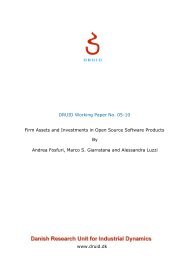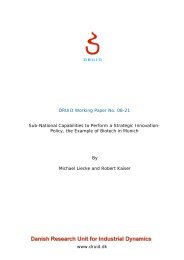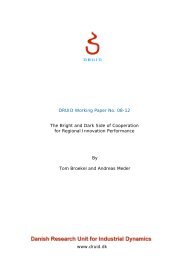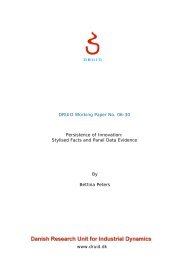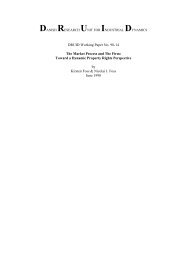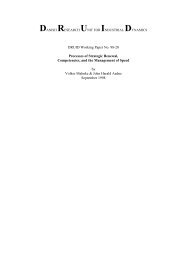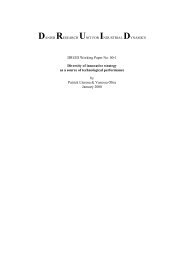danish research unit for industrial dynamics druid working paper no ...
danish research unit for industrial dynamics druid working paper no ...
danish research unit for industrial dynamics druid working paper no ...
You also want an ePaper? Increase the reach of your titles
YUMPU automatically turns print PDFs into web optimized ePapers that Google loves.
13encounter and interaction of two or more previously existing bodies of organisationalk<strong>no</strong>wledge. Thus the nature and the <strong>dynamics</strong> of the agreement can<strong>no</strong>t be fully grasped interms of flow and processing of in<strong>for</strong>mation among the partners and the costs and incentiveproblems stemming from such activities. Some recent approaches on collectivecompetences (Hodgson, 1996), k<strong>no</strong>wledge bases (Beije, 1996), decision rules <strong>for</strong>cooperation (Nooteboom, 1996) and on the paradox of learning (Bureth, Wolff and Zanfei,1996), illustrate this cognitive dimension that we would like to explore further.Moreover, learning can<strong>no</strong>t be reduced to mere in<strong>for</strong>mation acquisition, but it impliesinterpretation, that is the generation of mental models, cognitive frames, categories whichare <strong>no</strong>t contained in and can<strong>no</strong>t be derived from in<strong>for</strong>mation (cf. Dosi and Marengo (1994),Marengo (1996), Dosi, Marengo and Fagiolo (1996)). In social organisations and, a<strong>for</strong>tiori, in tech<strong>no</strong>logical agreements, k<strong>no</strong>wledge and learning processes are typicallydistributed 2 and a successful agreement is the one which sets the appropriate interactionmechanisms <strong>for</strong> generating new collective k<strong>no</strong>wledge.At least two orders of problems are involved in designing such mechanisms: a first issueconcerns the communication and sharing of k<strong>no</strong>wledge, a second one concerns the degreeof commonality/diversity of the k<strong>no</strong>wledge bases and the learning processes involved. Onthe first issue, in addition to the already widely analysed strategic problems of in<strong>for</strong>mationdisclosure, pre-strategic obstacles to communication and sharing of k<strong>no</strong>wledge arise fromits tacit component. Tacitness prevents k<strong>no</strong>wledge from being fully communicated as it is<strong>no</strong>t entirely transparent even to those who possess it. Nelson and Winter (1982) havebroadly discussed the implication of tacit k<strong>no</strong>wledge <strong>for</strong> eco<strong>no</strong>mic organisation, but it isworth stressing that, as argued by Polanyi (1969), tacitness is much more widespread thanusually considered in the evolutionary eco<strong>no</strong>mics and eco<strong>no</strong>mics of technical changetradition. While Polanyi refers mainly to the tacit components in skilful (mainly physical)activities, where of course <strong>no</strong> codified set of instructions could ever contain all thek<strong>no</strong>wledge required, tacitness appears more generally in every act of interpretation andmeaning attribution, as it depends on categories, mental models, cognitive frames which2 K<strong>no</strong>wledge is said to be distributed when a group of agents k<strong>no</strong>w something that <strong>no</strong>ne of the members ofsuch a set (fully) k<strong>no</strong>ws. Of course such collective k<strong>no</strong>wledge is generated by the social interactionmechanisms which connect together. Distributed k<strong>no</strong>wledge must be distinguished from other <strong>for</strong>ms ofsocial distribution of k<strong>no</strong>wledge such as common k<strong>no</strong>wledge, when every member of the group k<strong>no</strong>wssomething, he k<strong>no</strong>ws that all the others k<strong>no</strong>w it, he k<strong>no</strong>ws that all the others k<strong>no</strong>w that he k<strong>no</strong>ws it, and soon ad infinitum.



